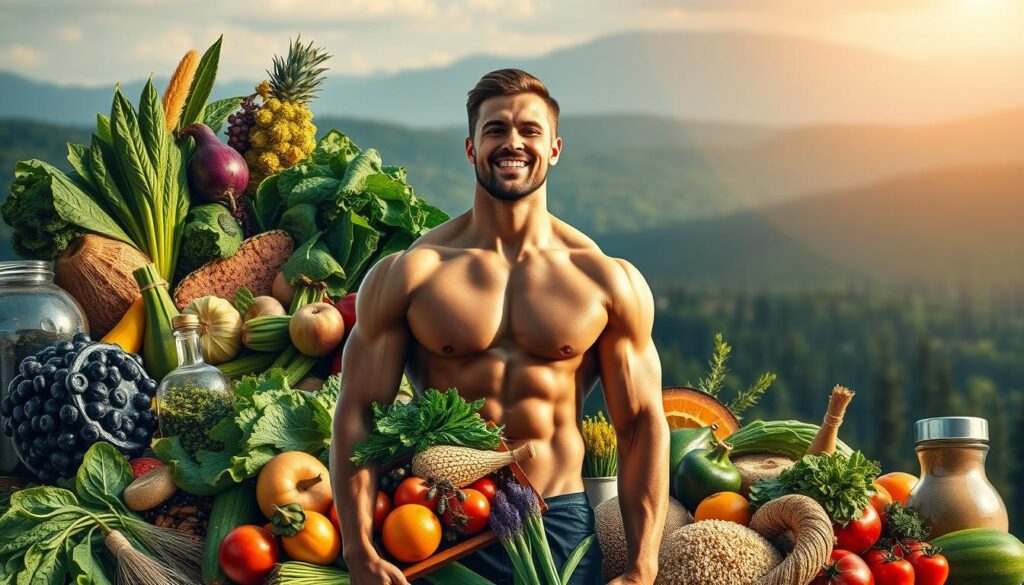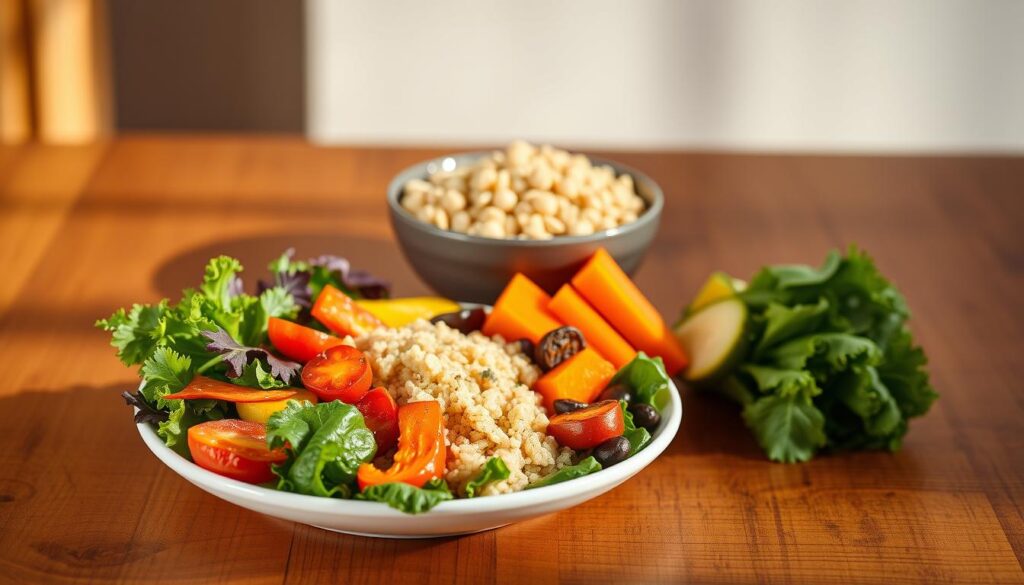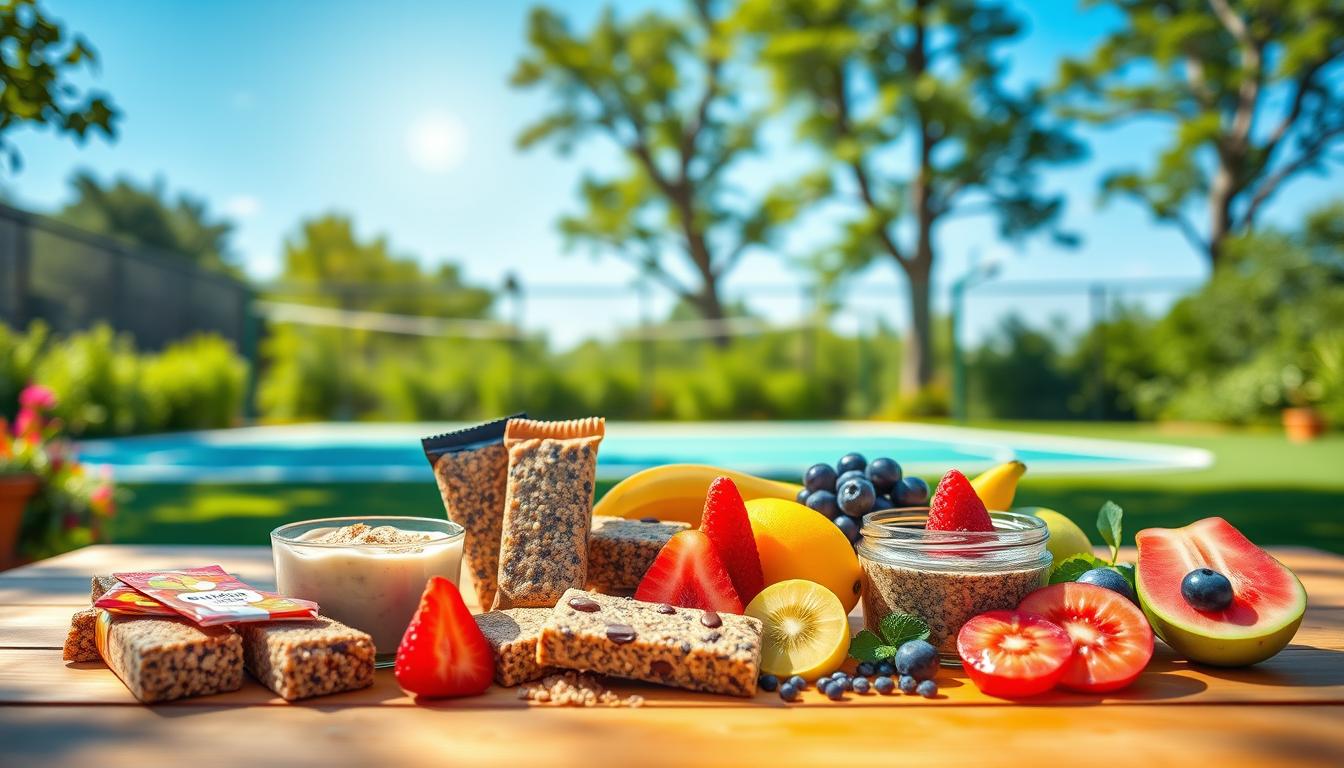Ever thought a vegan diet could help build muscle after 50? Many think plant-based diets can’t support muscle, especially as we get older. But recent studies show vegan diets can actually boost muscle growth for those over 50.
With conditions like sarcopenia on the rise, it’s key to know how plant-based nutrition fights muscle loss. This section will dive into how a well-planned vegan diet can support muscle health in your later years.
Understanding the Importance of Muscle Mass After 50
When you hit 50, knowing how vital muscle mass is becomes key for staying healthy. Muscle helps prevent frailty, which can cause serious health problems. As we age, our muscles naturally shrink, making it crucial to keep them strong.
Aging affects our muscles, increasing the chance of falls and injuries. Keeping muscle mass helps our metabolism and daily activities. It’s important to focus on muscle health to stay independent and healthy.
About 30% of older adults suffer from sarcopenia, a muscle-wasting condition. This shows how vital it is for those over 50 to stay active and eat right. By doing so, we can avoid muscle loss and live a healthier, more active life.
How Aging Affects Muscle Growth and Preservation
As people hit their 50s and beyond, the effects of aging on muscles become clear. Sarcopenia, a condition where muscle mass and function decrease, is a big issue. It starts as early as age 30 and gets worse with time, making it hard to keep strength and mobility.
Changes in the body, like less exercise, play a big part in muscle loss. Older adults often do less intense workouts, which hurts muscle health. Hormones like testosterone and growth hormone also drop, making it tough to build muscle.
Sarcopenia is a big problem, affecting nearly 30% of older adults. It raises the risk of falls, fractures, and disability. Knowing about these effects can help people fight muscle loss and live a healthier, more active life.
The Role of Protein in Muscle Development
Protein is key for muscle growth, especially for those over 50. As we age, losing muscle becomes a big concern. Eating enough protein helps our muscles recover and grow.
Essential amino acids are crucial. Our bodies can’t make them, so we need to eat them. They help build muscle and are found in plant-based proteins.
Research shows that enough protein can fight muscle loss with age. Eating high-quality protein and doing exercises helps grow muscles. This combo improves strength and body shape.
| Protein Source | Amino Acids Content (per 100g) | Protein Importance |
|---|---|---|
| Chickpeas | 7.3g | Supports muscle maintenance |
| Lentils | 9g | Aids recovery post-exercise |
| Quinoa | 4.4g | Complete protein profile |
| Brown Rice | 2.6g | Complementary to legumes |
Why Choose Vegan Diets for Lean Muscle
Choosing a vegan diet can bring many benefits for those wanting lean muscle. It’s not just about being kind to animals; it’s also good for your health. Vegan diets are packed with nutrients needed for muscle growth.
Studies show that plant-based proteins work just as well as animal proteins for building muscle. Vegan foods are full of antioxidants, vitamins, and minerals that boost health. Foods like legumes, whole grains, and nuts provide the protein needed, making vegan meals tasty and nutritious.
By going vegan, older adults can build muscle better and live longer. They also improve their health with better food choices.

High-Quality Plant Protein Sources for Older Adults
Older adults need a variety of plant proteins to keep their muscles strong and healthy. These plant proteins give the body the amino acids it needs. Legumes and whole grains are especially good for seniors, meeting their nutritional needs.
Legumes: Chickpeas, Lentils, and Beans
Legumes are key plant proteins, packed with vitamins and minerals. Chickpeas, lentils, and beans are great because of their nutrient-rich profiles. They offer:
- High fiber content for better digestion.
- Low glycemic index for steady blood sugar.
- Affordability for many families.
Legumes are perfect for seniors who need more nutrients. They help ensure a balanced diet.
Whole Grains like Quinoa and Brown Rice
Whole grains are vital for energy and nutrients. Quinoa is special because it has all nine essential amino acids. Brown rice pairs well with legumes, boosting protein and making meals complete.
Adding whole grains to meals boosts nutrition. It helps keep muscles strong and supports overall health in seniors. Legumes and whole grains together provide the protein seniors need to build muscle.
Vegan Diet Strategies for Building Lean Muscle
Starting a vegan fitness journey after 50 can be very rewarding. It offers many muscle building strategies vegan that boost muscle and strength. Planning your meals carefully is key, especially if you’re into weight training. Adding high-protein vegan foods to your diet can lead to great results.
It’s important to focus on when and what you eat. Eating protein-rich meals before and after workouts helps a lot. This way, your body gets the nutrients it needs to recover and build muscle. Good meal ideas for muscle gain include tofu stir-fries, lentil salads, and quinoa bowls with veggies and legumes.
Getting the right amount of calories and protein is crucial for your fitness goals. Using different protein sources like tempeh, seitan, and hemp seeds is key. This ensures you get all the amino acids your body needs. It supports muscle growth and fits well with a vegan diet, showing how important good nutrition is for muscle health over 50.
Complementing Proteins for Complete Amino Acid Profiles
Older adults need a variety of plant-based foods to build and keep muscle. Focusing on complementary proteins makes meals better. This ensures you get all the amino acids you need. By pairing amino acids, you can make dishes that help grow muscle.
Pairing Grains with Legumes
Grains and legumes together make complete proteins for muscle repair and growth. For example, rice with beans or lentils with quinoa is tasty and nutritious. This pairing makes meals both healthy and enjoyable.
Incorporating Nuts and Seeds for Added Variety
Nuts and seeds add protein and healthy fats to your diet. Adding almonds, chia seeds, or hemp seeds to meals boosts nutrition. Sprinkling seeds on salads or blending nuts into smoothies makes it easy to get enough protein.
| Combining Foods | Complete Protein Source |
|---|---|
| Brown Rice + Black Beans | Complete Protein |
| Quinoa + Chickpeas | Complete Protein |
| Barley + Lentils | Complete Protein |
| Oats + Almonds | Complete Protein |
Meal Planning for Optimal Muscle Gain on a Vegan Diet
Planning your meals is key to growing muscle on a vegan diet. A good meal plan helps you get the right nutrients before and after workouts. It’s important to eat foods rich in plant proteins and balanced across different groups to help your muscles recover and grow.
When planning meals, think about dividing them into pre- and post-workout phases. Eat carbs and proteins before working out, like smoothies with pea protein or quinoa salads with chickpeas. After, focus on replenishing energy and repairing muscles with foods like lentil stew or black bean wraps with greens.
It’s good to eat a variety of foods to get all the nutrients you need. Create a weekly meal plan that includes legumes, whole grains, fruits, and veggies. Here’s a sample vegan meal plan for muscle gain:
| Day | Breakfast | Lunch | Dinner | Snack |
|---|---|---|---|---|
| Monday | Chia pudding with almond milk and berries | Quinoa bowl with black beans and avocado | Lentil soup with whole-grain bread | Nut mix with seeds |
| Tuesday | Smoothie with spinach, banana, and pea protein | Whole-grain wrap with hummus and mixed veggies | Stir-fried tofu with brown rice and broccoli | Apple with almond butter |
| Wednesday | Overnight oats with flax seeds and agave | Chickpea salad with olive oil and lemon | Stuffed bell peppers with quinoa and lentils | Carrot sticks with tahini |
| Thursday | Fruit salad with walnuts and hemp seeds | Vegetable sushi rolls with brown rice | Curried chickpeas with basmati rice | Cucumber slices with guacamole |
| Friday | Tofu scramble with tomatoes and spinach | Red lentil pasta with marinara sauce | Vegetable chili with kidney beans | Protein bar |
| Saturday | Pancakes made with oats and almond milk | Salad with farro, chickpeas, and mixed greens | Vegetable kebabs with sweet potatoes | Popcorn with nutritional yeast |
| Sunday | Granola with soy yogurt and berries | Buddha bowl with vegetables, brown rice, and tofu | Mushroom and spinach risotto | Trail mix |
By following these vegan meal planning tips, you can help your muscles grow while staying healthy.

Important Nutrients for Elderly Muscle Health
As people get older, keeping their muscles strong is key. Important nutrients help a lot with this. Vitamins and minerals are especially important for older adults. They help keep muscles healthy and strong.
Essential Amino Acids and Leucine Intake
Amino acids are the basic parts of protein. For older adults, getting enough of these is very important. Leucine helps grow muscle protein. Foods like soy, lentils, and nuts are full of these amino acids.
Vitamins and Minerals That Support Muscle Function
Some vitamins and minerals are crucial for muscles. Vitamin D helps with calcium absorption and muscle work. Calcium is key for muscle function. Omega-3 fatty acids also help keep muscle mass. Focusing on these nutrients is important for older adults.
The Benefits of Resistance Training and Vegan Diets
Adding resistance training to your routine has many benefits, especially for older adults. It helps grow muscles and keeps them strong. For those on a vegan diet, combining strength training with enough protein is key to fight muscle loss as you age.
Vegan workouts offer special benefits for muscle growth and health. A well-planned vegan diet can give you the nutrients you need for strength training. Plant-based proteins, when paired with workouts, boost muscle growth, leading to better strength and endurance.
This mix of diet and exercise does more than just keep muscles strong. It helps older adults stay mobile, lowers injury risk, and keeps them independent. Focusing on both nutrition and exercise is a strong way to live a healthy life.
Hydration and Recovery: Key Components of Muscle Maintenance
Drinking enough water is key to keeping muscles healthy. It helps muscles work well during exercise and recover afterward. Without enough water, you might feel tired and take longer to get back to normal.
After working out, your body loses water through sweat. Drinking water and eating the right foods are both important for muscle repair. Foods with carbs and plant proteins help your body recover and grow muscle.
Adding hydration and recovery to your daily routine can boost your performance and health. Drink water all day and listen to your body to stay hydrated. Combining water with the right foods is a great way to keep your muscles strong and lean.
Common Challenges and Solutions for Vegan Muscle Builders
Building muscle on a vegan diet is tough for people over 50. They might not get enough vitamins and minerals. Knowing these challenges helps plan better and find solutions for a plant-based diet.
Nutrient Deficiencies to Watch Out For
Some important nutrients are hard to get from a vegan diet, especially for muscle growth. Key ones include:
- Vitamin B12: It’s key for energy and blood cells, found mainly in animal products. Look for fortified foods or supplements.
- Iron: It helps carry oxygen in the blood. Lentils and spinach are good sources, but vitamin C helps absorb it better.
- Zinc: It’s for immune health and muscle repair. Beans, nuts, and whole grains are good sources.
Strategies to Overcome Dietary Limitations
To beat vegan diet challenges, plan meals carefully. Make sure they’re full of protein and important vitamins. Here are some tips:
- Plan meals to include a variety of nutrient-rich foods. This ensures you get enough protein and vitamins.
- Try fortified foods like plant-based milks and nutritional yeast to boost your nutrient intake.
- Think about taking supplements, especially for Vitamin B12, to keep your diet balanced and avoid deficiencies.
Real-Life Success Stories of Vegan Muscle Builders Over 50
Older vegan athletes show us it’s possible to grow muscle and stay vital after 50. Their stories are powerful examples of how a plant-based diet can keep you strong and healthy. These tales are not just about physical changes but also about living a better life.
Many vegan athletes over 50 have shared their amazing achievements. They prove that sticking to a vegan lifestyle can greatly improve muscle mass and performance. For example, an octogenarian bodybuilder shows how a vegan diet can break age barriers. Their experiences are inspirational transformations that challenge what we think about aging and strength.
To see these changes in action, here’s a table with some remarkable vegan muscle success stories:
| Name | Age | Training Style | Achievements |
|---|---|---|---|
| Bodybuilder A | 65 | Weightlifting | Increased muscle mass by 30% in 2 years |
| Athlete B | 58 | CrossFit | Competed in regional competitions |
| Runner C | 72 | Endurance Training | Completed multiple marathons |
| Fitness Coach D | 55 | Bodyweight Exercises | Improved overall strength and flexibility |
These inspirational transformations show what’s possible for anyone over 50. As more older vegan athletes share their stories, the idea that plant-based diets can build muscle gains strength. This encourages others to take on their own health challenges with confidence.
Conclusion
Starting a vegan diet can help build muscle after 50. We talked about how to use plant-based foods to get the right nutrients. Legumes, whole grains, nuts, and seeds are key for muscle growth.
Vegan diets do more than just help with muscle. They also boost overall health and happiness. With the right meal plans and nutrients, it’s easy to stay strong and full of energy as you age.
Choosing a vegan diet is good for your body and the planet. It lets people over 50 live a healthy, active life. This choice helps them stay strong and enjoy life to the fullest.
FAQ
Can a vegan diet provide enough protein for muscle building after 50?
Yes, a vegan diet can give you enough protein. You can get it from legumes, whole grains, nuts, and seeds. Studies show plant-based proteins work just as well as animal proteins for building muscle.
How does aging affect muscle mass?
Aging leads to a natural loss of muscle mass. This can cause frailty and increase fall risks. Keeping muscle mass up is key for metabolism and health.
What role do essential amino acids play in muscle development?
Essential amino acids are vital for muscle growth. They help repair and build muscle. Older adults need enough of these to maintain or grow muscle.
What are some high-quality plant protein sources suitable for older adults?
Good plant protein sources include chickpeas, lentils, and beans. Whole grains like quinoa and brown rice are also great. Mixing different sources ensures you get all amino acids.
How can I effectively plan meals to support muscle gain on a vegan diet?
Plan meals with high-protein vegan foods around workouts. Focus on calorie intake and protein quality to meet fitness and nutrition goals.
Which vitamins and minerals are important for muscle strength and recovery?
Vitamins and minerals like Vitamin D, calcium, omega-3 fatty acids, and leucine are crucial. Adding these to your diet boosts muscle health and recovery.
What are some common challenges faced when building muscle on a vegan diet?
Challenges include nutrient deficiencies and meal prep. Plan meals well and consider supplements for Vitamin B12, iron, and zinc.
Are there any real-life examples of individuals over 50 successfully building muscle on a vegan diet?
Yes, many over 50 have built muscle on a vegan diet. Their stories show a well-planned vegan diet supports muscle growth and vitality in later years.
Is hydration important for muscle maintenance in older adults?
Absolutely. Hydration is key for performance and recovery. Drinking enough water supports muscle function and health, especially during and after workouts.




